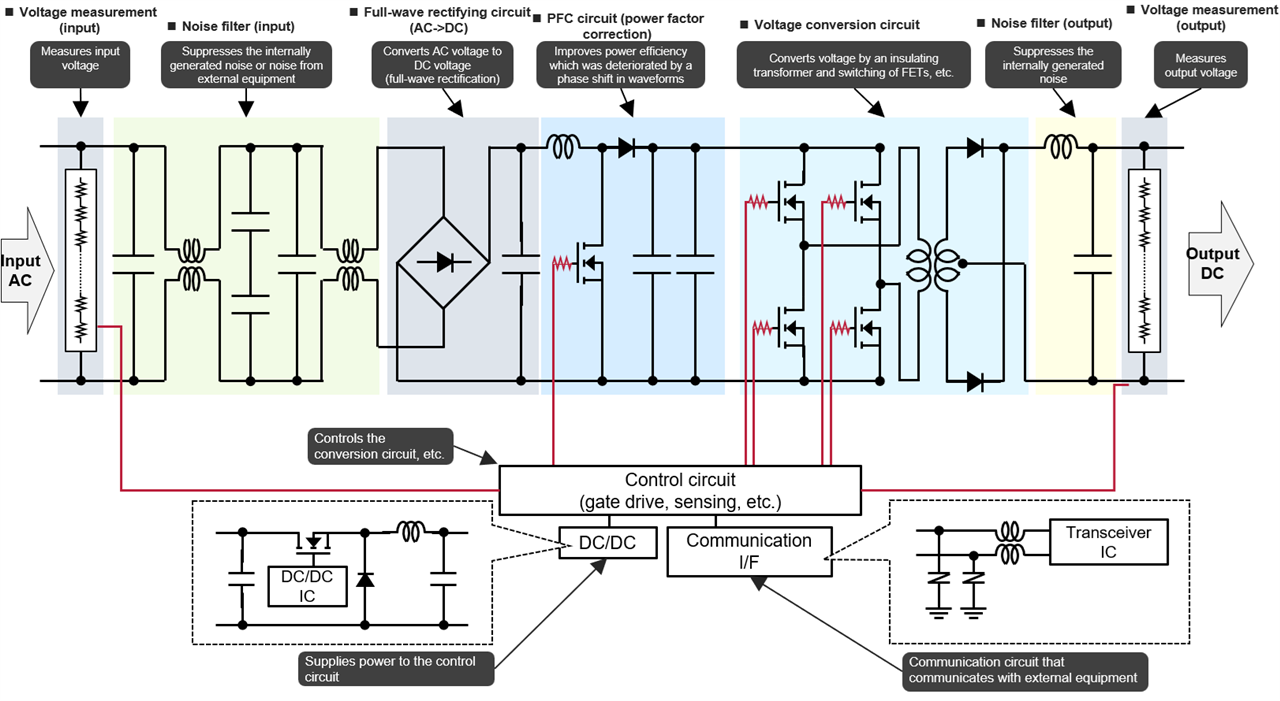— Panasonic’s High-Efficiency AC/DC Conversion System for Faster EV Charging —
 What Does an On-Board Charger (OBC) Do?
What Does an On-Board Charger (OBC) Do?
 Types of EV Charging
Types of EV Charging
・Normal charging
In normal charging, the battery is charged to full. The battery of an EV is charged with AC voltage from a private residents' charging equipment or a public charging station. Generally, charging the battery fully takes about eight hours. In the case of normal charging, the OBC incorporated in the vehicle converts AC voltage into DC voltage applicable to the vehicle battery.
・Quick charging
Quick charging is charging to refill the battery in a short time. In quick charging, the charging station supplies DC voltage corresponding to the battery voltage, charging up the vehicle battery in a short time by quickly feeding the battery with large power. Quick charging, in general, takes about 30 minutes to 1 hour to finish, depending on the battery capacity. You will find those chargers for EVs in a lot of expressway rest areas, commercial establishments, etc.
| Charging Type | Power Source | Location | OBC Usage | Charging Time | Purpose |
|---|---|---|---|---|---|
| Normal Charging | AC (200V/400V) | Home, Office | Converts AC to DC | ~8 hours | Full battery charge |
| Fast Charging | DC (direct output) | Highways, Commercial Facilities | Not used | ~30–60 minutes | Quick top-up |
 Battery Capacity & OBC Output
Battery Capacity & OBC Output
 Market Trends & Component Requirements
Market Trends & Component Requirements
- Higher output power
- Faster charging times
- Smaller battery sizes
- High voltage tolerance
- Large current capacity
- Low power loss
- High heat resistance
- Compact design
OBC System Architecture
- Voltage Measurement (Input/Output) – Controls conversion accuracy using high-precision chip resistors.
- Noise Filters (Input/Output) – Suppress external and internal noise using automotive-grade film capacitors.
- Full-Wave Rectifier & PFC Circuit – Converts AC to DC and improves efficiency using capacitors and inductors.
- Voltage Conversion Circuit – Uses transformers and switching elements with noise-suppressing resistors.
- DC/DC Converter – Powers control circuits using hybrid aluminum electrolytic capacitors and power inductors.
- Communication Interface – Protects transceiver ICs from ESD using chip varistors.

 Panasonic Components for OBC Systems
Panasonic Components for OBC Systems
| Component | Features | High Voltage | High Current | Low Loss | Compact | Heat Resistant | High Precision |
|---|---|---|---|---|---|---|---|
| Hybrid Aluminum Electrolytic Capacitors | Low ESR, High Reliability | ||||||
| Automotive Power Inductors | High Current, Low Loss | ||||||
| High-Precision & High-Power Chip Resistors | High Accuracy, Heat Resistance | ||||||
| Chip Varistors | Compact, Lightweight | ||||||
| Automotive Film Capacitors | High Reliability |

